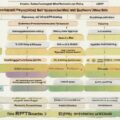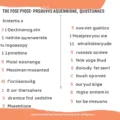Introduction
In today’s fast-paced world, both children and adults face numerous challenges that can impact their mental well-being. Coping scales are valuable tools that help individuals manage stress, anxiety, and other mental health issues. This article will explore the 9 best coping scales for both children and adults, providing insights into their benefits and usage.
1. The Brief COPE Scale
The Brief COPE Scale is a widely used tool that assesses how people respond to stress. It includes 28 items that are divided into 14 subscales, each reflecting different coping strategies such as active coping, denial, and acceptance. This scale is useful for both children and adults, making it versatile for various settings.
2. The Kidcope
Designed specifically for children, the Kidcope is a short and effective tool that helps assess how kids cope with stress. It includes 10 coping strategies and is easy to administer, making it ideal for use in schools and pediatric settings.
3. The Coping Inventory for Stressful Situations (CISS)
The CISS is a comprehensive tool that measures three main coping styles: task-oriented, emotion-oriented, and avoidance-oriented coping. It is suitable for both adolescents and adults, providing a detailed understanding of an individual’s coping mechanisms.
4. The Adolescent Coping Scale (ACS)
The ACS is designed to evaluate how adolescents cope with stress. It includes 80 items that cover various coping strategies, allowing for a thorough assessment. This scale is particularly useful for identifying maladaptive coping behaviors in teenagers.
5. The Coping Strategies Inventory (CSI)
The CSI assesses coping strategies across two dimensions: problem-focused and emotion-focused coping. It includes 72 items and is suitable for both adults and adolescents, making it a versatile tool for mental health professionals.
6. The Ways of Coping Questionnaire (WCQ)
The WCQ is a well-known tool that measures coping processes. It includes 66 items and covers a wide range of coping strategies such as problem-solving, seeking social support, and avoidance. This scale is suitable for both children and adults.
7. The Children’s Coping Strategies Checklist (CCSC)
The CCSC is specifically designed for children and includes 52 items that assess various coping strategies. It provides insights into how children deal with stress at home, school, and in social situations, making it a valuable tool for parents and educators.
8. The COPE Inventory
The COPE Inventory is a comprehensive tool that measures a wide range of coping strategies. It includes 60 items and is suitable for both children and adults. This scale is particularly useful for research purposes due to its detailed assessment capabilities.
9. The Stress and Coping Questionnaire (SCQ)
The SCQ assesses how individuals respond to specific stressful situations. It includes 30 items and is suitable for both children and adults. This tool is particularly useful for identifying specific coping strategies that may be beneficial or detrimental.
FAQ
1. What is a coping scale?
A coping scale is a tool used to assess how individuals manage stress and other challenging emotions. These scales typically include various items or questions that reflect different coping strategies.
2. Why are coping scales important?
Coping scales are important because they help identify how individuals deal with stress, which can inform interventions and support mechanisms to improve mental well-being.
3. Can coping scales be used for both children and adults?
Yes, many coping scales are designed to be used for both children and adults. Some scales are specifically tailored for certain age groups, but there are versatile tools that cater to all ages.
4. How are coping scales administered?
Coping scales can be administered in various settings, including schools, clinics, and research environments. They are typically self-report questionnaires that individuals complete on their own or with the help of a professional.
5. What are some common coping strategies assessed by these scales?
Common coping strategies assessed by these scales include problem-solving, seeking social support, avoidance, denial, acceptance, and emotion-focused coping.
Conclusion
Coping scales are essential tools for understanding how individuals manage stress and adversity. Whether for children or adults, these scales provide valuable insights that can guide interventions and support mental health. By using the right coping scale, mental health professionals can better tailor their approaches to meet the needs of their clients.









